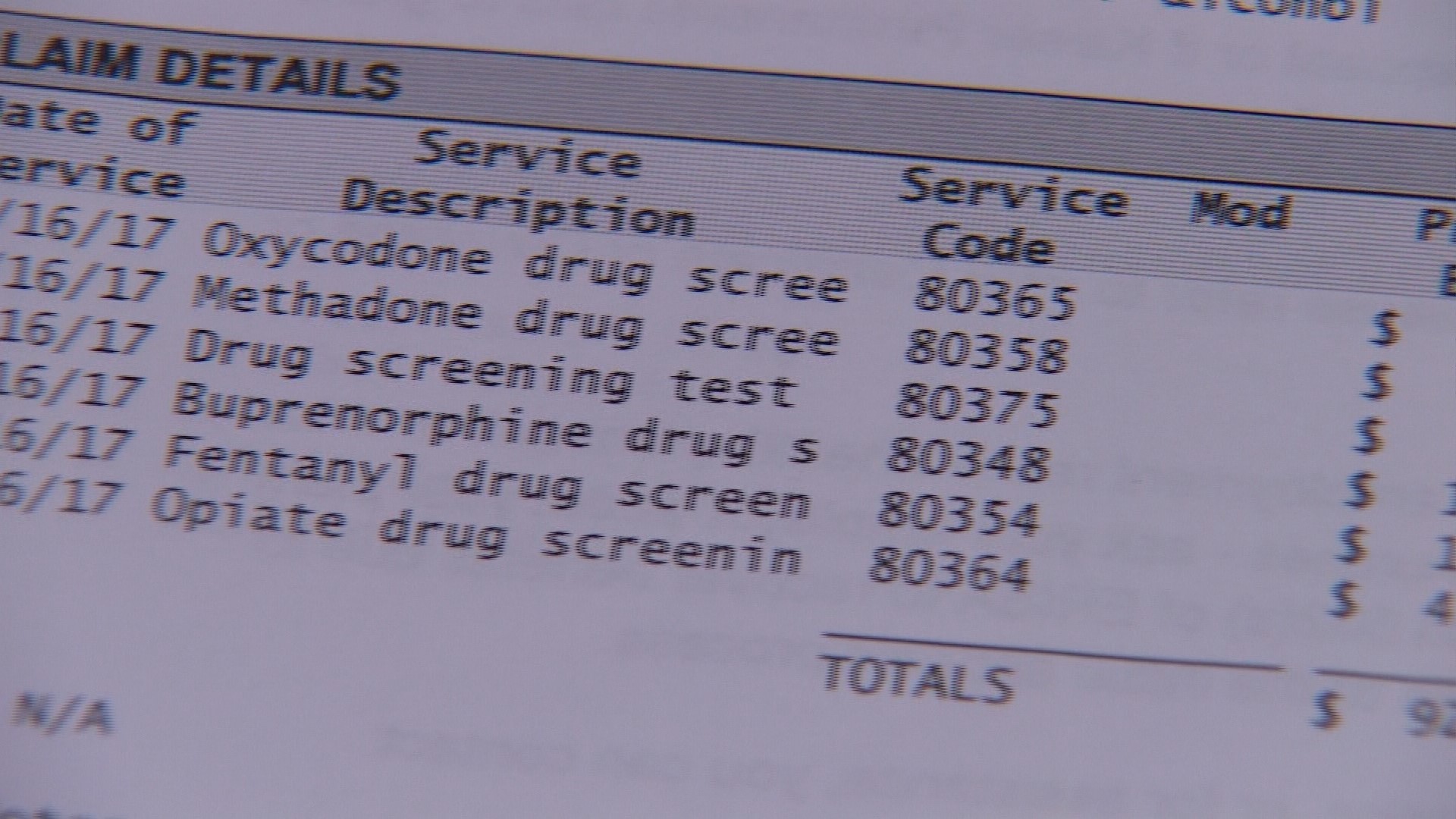Washington state regulators are investigating what they call a drug testing “scam” involving several chemical dependency treatment centers located in the south Puget Sound region.
The officials say medical doctors may be part of the scheme, which charged thousands of dollars in questionable billings to patients’ insurers.
Charles Connor was a client at one of the accused clinics, Doorway to Recovery in Lakewood.
“Overall for my two visits, it was $5,992 worth of claims,” Connor said as she sorted pages of billing records from his insurer, Kaiser Permanente.
The bills stunned Connor because he said he’d only been to the clinic twice, and each time he said he received no treatment. Connor said counselors at Doorway collected his insurance information, and he left a urinalysis (UA) sample both times he visited. But the clinic stalled on beginning his actual treatment sessions, he said.
EDITOR'S NOTE: After this story aired Doorway to Recovery's lawyer, Mark G. Olson, disputed that the clinic delayed treatment. Olson said "...Mr. Connors went AWOL and did not show up again for over two months after his initial visit." Charles Connor stands by his claim that Doorway staff delayed his treatment and told him that they were having problems getting approval from his insurance company. (END OF EDITOR'S NOTE)
Ordered by a judge to receive alcohol counseling for violating a no-contact order, Connor was forced to find another clinic. It was when he started getting services at Crossroads Treatment Center that employees there explained to Connor that his insurance had been billed thousands of dollars for toxicology screens on the two urine samples processed by Doorway.
“The charge for that was just outrageous,” said Crossroads administrator Leila Saucier. “We bill the insurance company $59” for a UA test that covers a range of drugs, Saucier said. “It includes all the basic drugs like opiates and methamphetamine.”
Crossroads owner Jeremiah Saucier said a treatment clinic like his or Doorway must get a physician’s signature to order the more sophisticated and expensive UA tests.
“The doctor can get authorization through the insurance companies that we can’t,” said Saucier. He said his clinic rarely, if ever, orders tests like the $476 screen for opiates that showed up on Connor’s bill.
John Dorman is the owner of Doorway to Recovery, and two other south Sound treatment centers called Abracadabra, and A Change Counseling Renton.
Dorman and his clinics were featured in KING 5’s 2016 reports about counselors at his clinics accepting bribes from clients, and then allowing those clients to skip their court-ordered chemical dependency treatment.
After the “Sobriety for Sale” reports were aired, the Washington State Department of Health investigated and charged Dorman with “unprofessional conduct” on a variety of charges.
One charge alleges a “UA Scam” that sounds strikingly similar to what happened to Charles Connor -- “UA’s would be submitted to a laboratory, which would grossly overcharge for testing.”
In an email to KING 5, Dorman’s lawyer Mark G. Olson denied all the accusations.
“As we informed you a year ago, the allegations are false and will be shown to be so when this matter is presented to administrative hearing,” Olson wrote. Dorman faces an administrative hearing in early 2018 to answer to the charges of unprofessional conduct.
Among the witnesses Dorman could face is Jeremiah Saucier, the owner of Crossroads Treatment Center where Connor ultimately ended up.
Saucier says he and Crossroads former owner Jim Hand, an acquaintance of Dorman’s, were invited in 2015 by Dorman to join a scheme to increase their clinic’s billings.
“After the meeting with John Dorman, he said, ‘The next step is you need to meet Dr. Markus,’” Saucier said.
Saucier said Dorman introduced him to Bellevue doctor Stephen Markus. Saucier said for a $2,000 monthly fee, Dr. Markus would become Crossroads’s medical director and sign off on the higher priced UA tests that would be shipped off to an out-of-state laboratory.
“All of a sudden you’re getting $700 for a UA. That didn’t make sense to us,” said Saucier. He and his partner declined to participate.
“We’re in this business and our goal is to help people, not to take advantage of them,” said Saucier.
Dr. Markus denied that he was part of any “UA Scam.”
“We came in as a clean, trusting partner and we ended up in a disaster that we’d been duped and became of victim of this,” Dr. Markus said.
Markus, who spoke to KING 5 by phone and joined by his lawyer and a public relations consultant, said he was unaware that Dorman was using his physician’s ID to bill insurance companies for expensive UA tests. He only learned, he said, when some of that billing information reached his office.
Markus said he cut ties with Dorman in 2016 and alerted insurance companies to the improper billing.
“We did not know,” Markus said of Dorman. “We were young and dumb and trusting, and he did not act like dozens of other clinics I worked for.”
By the time Charles Connor walked into Doorway to Recovery in 2016, Tacoma physician Dr. Scott Havsy was the medical director.
Havsy’s name appears on Connor’s insurance billing records as the referring physician.
“This is neither unusual, nor somehow inappropriate as you seem to suggest,” Havsy wrote in an email to KING 5.
Havsy explained that listing a “referring physician” is common on lab requests, and it does not mean that he provides “…medical care or treatment for the individual.” Havsy claimed this was standard practice.
However, he did not answer repeated questions about whether the expensive, sophisticated urine tests ordered for Charles Connor were necessary and appropriate.
“I have nothing further to add without a HIPPA compliant release, which has to be notarized,” Havsy wrote, citing the federal medical privacy law.
-- Follow Chris Ingalls on Twitter @CJIngalls


